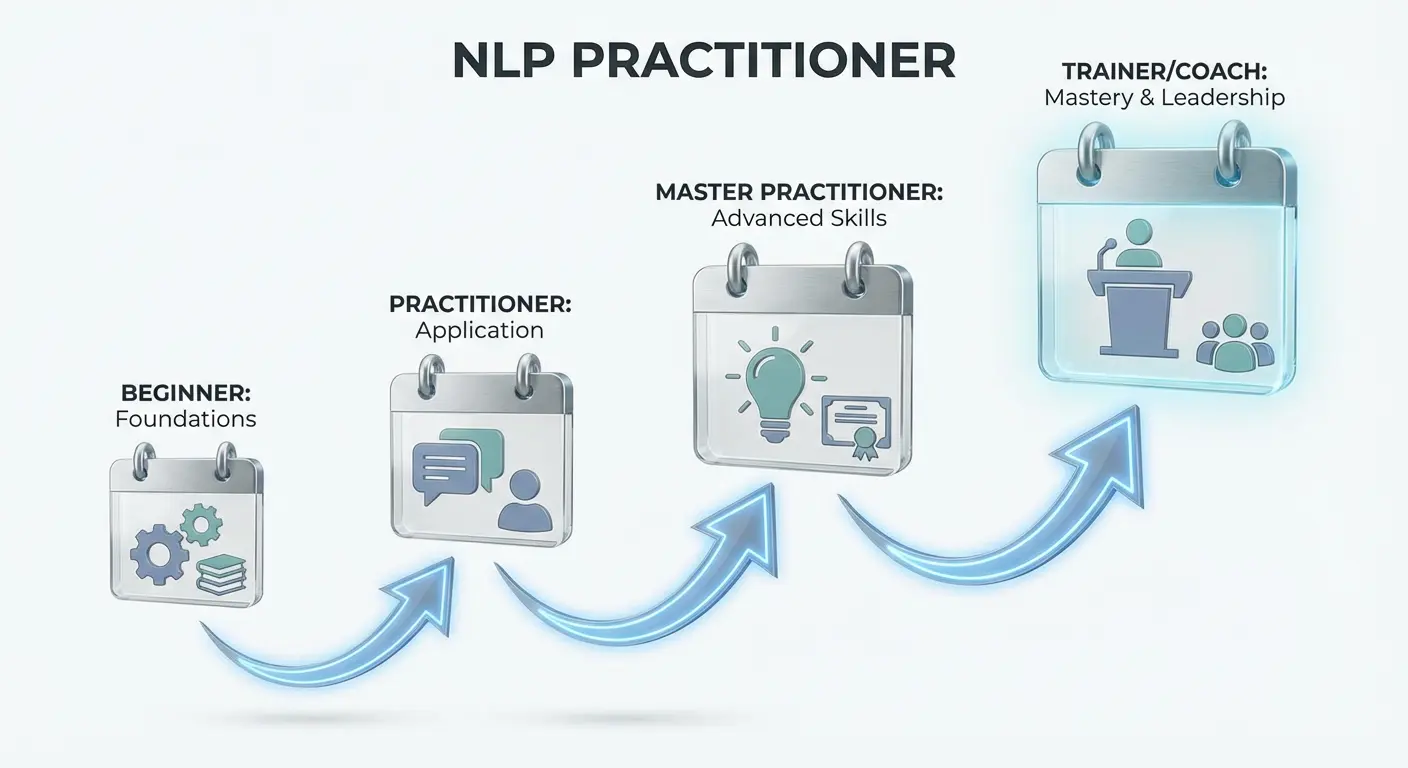You’re considering NLP certification to elevate your leadership presence and communication skills, but every training provider gives you different timelines: 7 days here, 6 months there, even a year for “full mastery.” Which is it?
Key Takeaway:
- Certification is just the start—NLP Practitioner training takes 60-120 hours (7-30 days intensive), but true competence demands 3-6 months of deliberate practice to master rapport-building, reframing, anchoring, and meta-model questioning for real-world breakthroughs in leadership and communication.[1]
- Choose your path wisely: Intensive formats for rapid immersion (7-14 days), extended (3-6 months) for integration; no prior experience needed—business pros accelerate via hybrid options, turning subconscious patterns into tools that boost client results and career edges in coaching or sales.[1]
- From Practitioner to Master: Build foundational skills first (2-4 weeks + practice), then advance to 120+ hours on advanced patterns like belief change and modeling excellence—total 1-2 years for elite proficiency that commands $500+/hour rates and corporate gigs.[2]
- Dodge the rush: Skip “quickie” certs without application—commit to 15-min daily practice on real scenarios, gather testimonials, and invest $500-$3,000 wisely; ongoing mastery (no renewals) creates a virtuous cycle of confidence, testimonials, and transformative impact.[2]
Bottom Line: Become an NLP Practitioner not for the badge, but for the power—start with accredited training today, practice relentlessly for 3-6 months, and unlock the skills that elevate your career from competent to unstoppable.
- Source: Unleash Your Power – How Long Does It Take To Become An NLP Practitioner (introduction, what is NLP, training process & formats sections)
- Source: Skills learned, career opportunities, common pitfalls, FAQs & practical advice
If you’ve felt confused sorting through conflicting information, you’re not alone. The truth is more nuanced than most marketing materials suggest: getting a certificate can happen quickly, but becoming a professionally competent NLP practitioner takes intentional practice and application.
In this post, you’ll discover the realistic timeline for becoming a professionally competent NLP practitioner, what factors influence your learning curve, and how to integrate training strategically into your career without putting life on hold. No hype, just practical insights from 20+ years of training professionals like you.
What Are the Standard NLP Practitioner Certification Timelines?
Let’s start with what certification bodies actually require. According to certification body requirements, the minimum standard for NLP Practitioner certification is 120 hours of training in basic NLP patterns. However, typical certification requirements vary significantly by program, ranging from 60 to 120 hours depending on the certifying organization and curriculum depth.
But here’s what matters more than hours: the distinction between certification and competence.
The Certification vs Competence Distinction
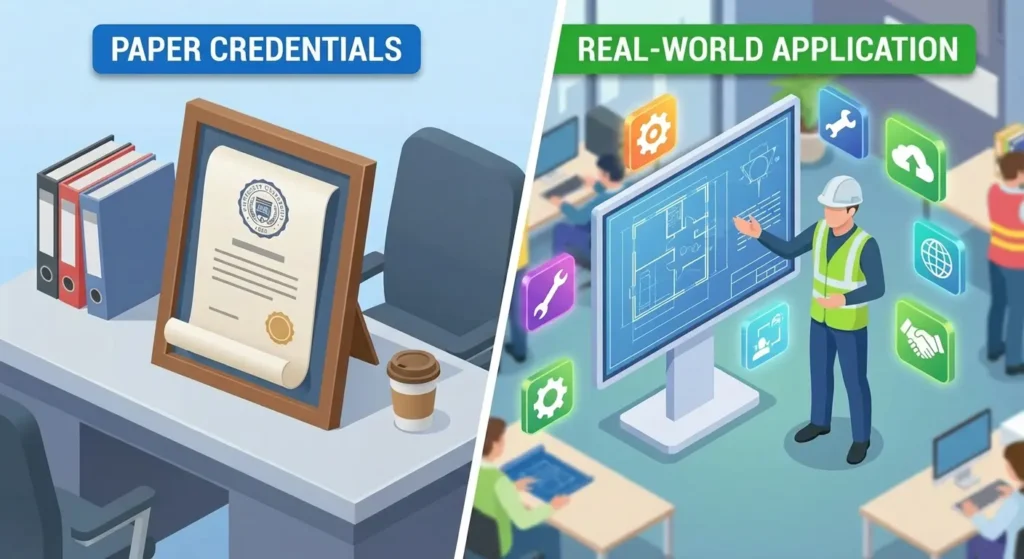
You can walk away with a certificate after a week-long intensive course. But can you skillfully apply NLP techniques in high-stakes business situations? That’s where the real timeline begins.
Think of it like learning to drive. You can pass your driver’s test in a few weeks, but becoming a confident driver in challenging conditions takes months of real-world practice. NLP certification works the same way as the paper credential is your starting point, not your finish line.
Typical Training Hour Requirements
Most reputable programs deliver comprehensive practitioner development through 20-30 days of training spread over an extended period. This structure allows crucial practice and integration time between learning sessions, which is where genuine skill-building happens.
Intensive vs Extended Learning Formats
You’ll encounter two main formats:
Intensive programs: 7-14 consecutive days of immersive training. These deliver rapid exposure to techniques but require significant post-training practice to embed skills.
Extended programs: Training spread over 3-6 months with practice assignments between sessions. Programs focused on developing sustainable competence typically use this format because it allows skills to transition into habits rather than remaining theoretical knowledge.
For busy professionals, extended formats often produce better outcomes because you’re applying techniques in real work situations while still receiving guidance.
How Long Does Each Certification Level Actually Take?
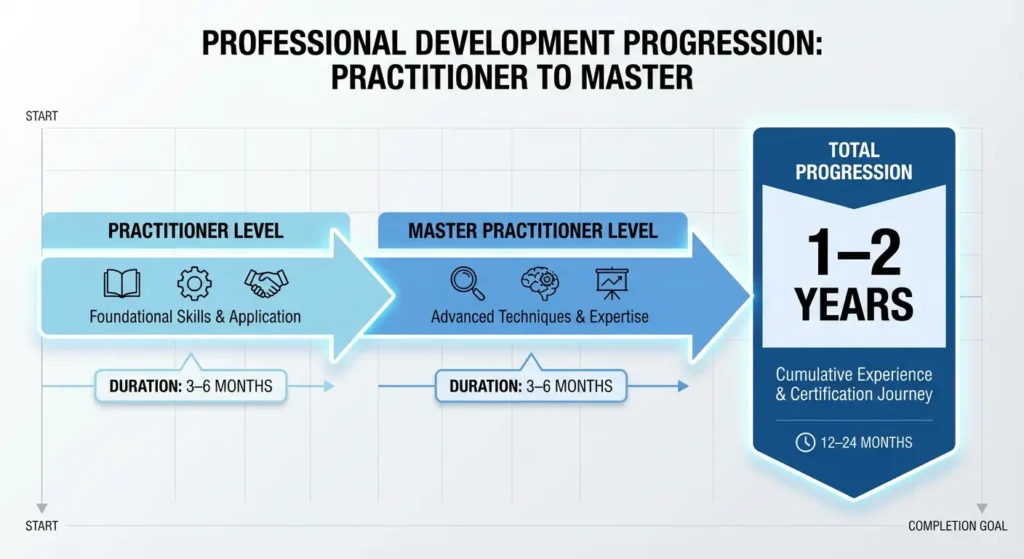
The realistic timeline from beginner to certified NLP practitioner is 3-6 months for foundational competence, and that’s just Practitioner level.
Here’s how the journey typically unfolds:
Practitioner Certification: Your Foundation
At the Practitioner level, you’ll invest 2-4 weeks of actual training time (whether compressed or spread out) learning core NLP techniques like rapport-building, sensory acuity, reframing, anchoring, and the meta-model. Flexible certification pathways now allow completion in as little as 12 weeks through self-paced online formats, though most programs recommend 85+ hours total, including practice.
But here’s what the brochures don’t tell you: your real education begins after certification. You’ll need consistent application over 3-6 months to move from “I understand this concept” to “I can deploy this technique effectively under pressure.”
Master Practitioner: Advanced Application
Once you’ve mastered Practitioner-level skills, Master Practitioner training adds another layer, typically 120+ additional hours focused on advanced language patterns, modeling excellence, belief change, and values work. This level usually takes another 3-6 months of training and practice.
The full journey from complete beginner to Master Practitioner certification typically spans 1-2 years when you account for both training time and the practice hours needed to develop genuine expertise.
The Hidden Timeline: Post-Certification Practice
One professional, Heather, completed our NLP Practitioner training, seeking clarity on the application. She walked away with not just certification, but a practical framework that transformed her business approach and coaching practice, but only because she committed to practicing the techniques consistently in real situations.
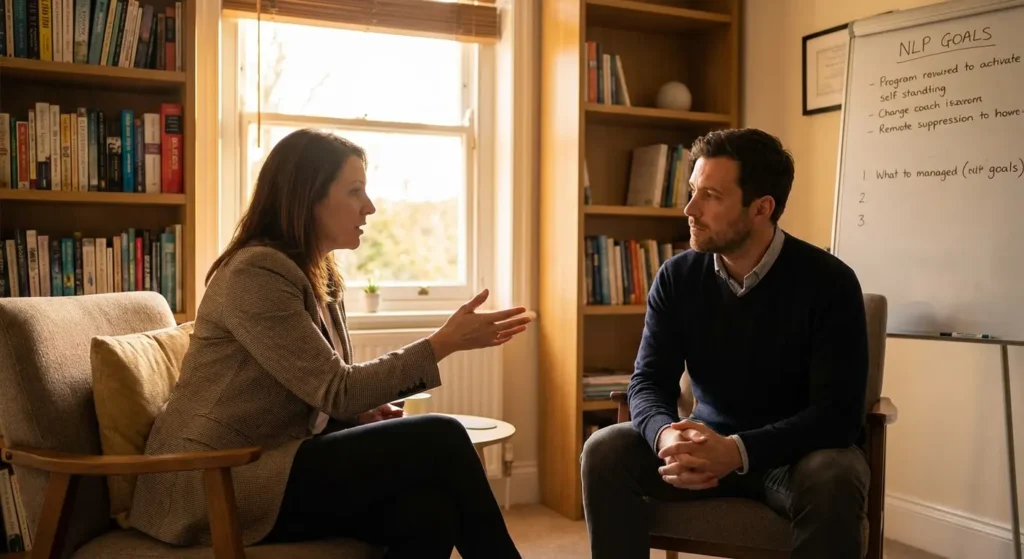
As one experienced trainer notes, there’s a distinction between certification and mastery. You might get your certificate in 7 days, but true mastery is a lifetime of learning and application. If you’re exploring transitioning into professional coaching, expect to invest 6-12 months of active practice before you’re consistently producing transformational results for clients.
For those building professional practice after certification, the timeline extends further. New practitioners typically start by working with friends and colleagues to gain confidence and collect testimonials, a process that takes several months before transitioning to paid client work.
What Factors Speed Up or Slow Down Your NLP Journey?
Your timeline isn’t just about program length. Several factors influence how quickly you develop professional competence.
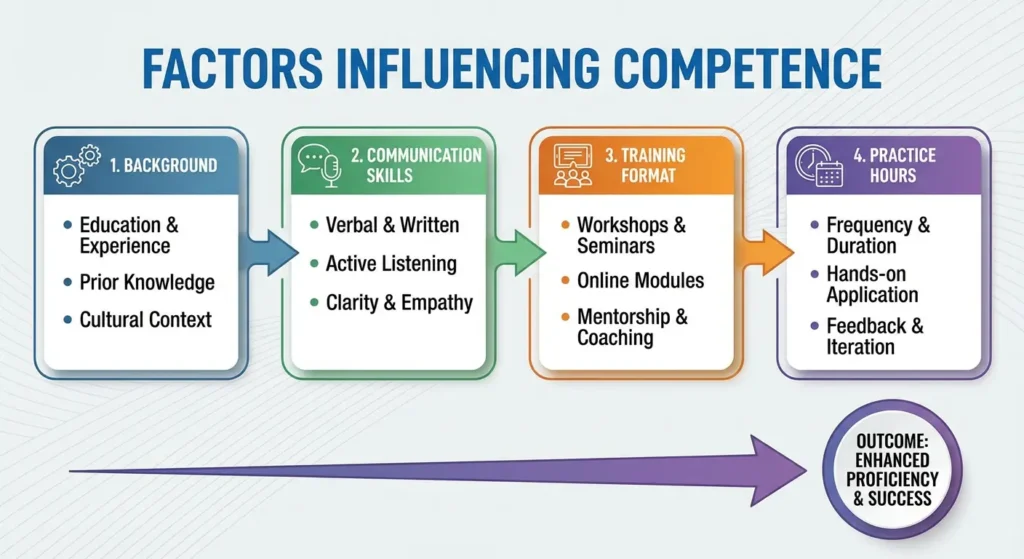
Your Professional Background Matters
If you’re already in a leadership role, coaching position, or client-facing profession, you’ll develop NLP skills faster because you’re applying them immediately in meaningful contexts. A sales director practicing rapport techniques in negotiations will gain competence faster than someone without regular interpersonal challenges to navigate.
Your existing communication skills, emotional intelligence, and self-awareness also accelerate learning. NLP builds on these foundations; it doesn’t create them from scratch.
Training Format: Online vs In-Person vs Hybrid
In-person intensives create powerful immersion and peer learning but require significant time away from work. Online programs offer flexibility but demand more self-discipline and may lack the immediate feedback that accelerates skill development.
Hybrid models often provide the best of both worlds: online learning for concepts combined with live practice sessions for skill refinement. Consider which format aligns with your learning style and schedule constraints.
Practice Hours Between Sessions
Programs following professional development standards emphasize continuous professional development because certification is just the beginning. The practitioners who develop genuine expertise are those who practice techniques weekly in meetings, conversations, presentations, and coaching sessions, not those who cram training into a single week and never apply it.
Quality practice matters more than quantity. Fifteen minutes of focused daily practice with conscious attention to technique will develop your skills faster than occasional unfocused application.
Can You Get NLP Certified While Working Full-Time?
Absolutely. Most professionals pursuing NLP certification are working full-time, and smart program design accommodates this reality.
Here’s how busy professionals successfully integrate NLP training:
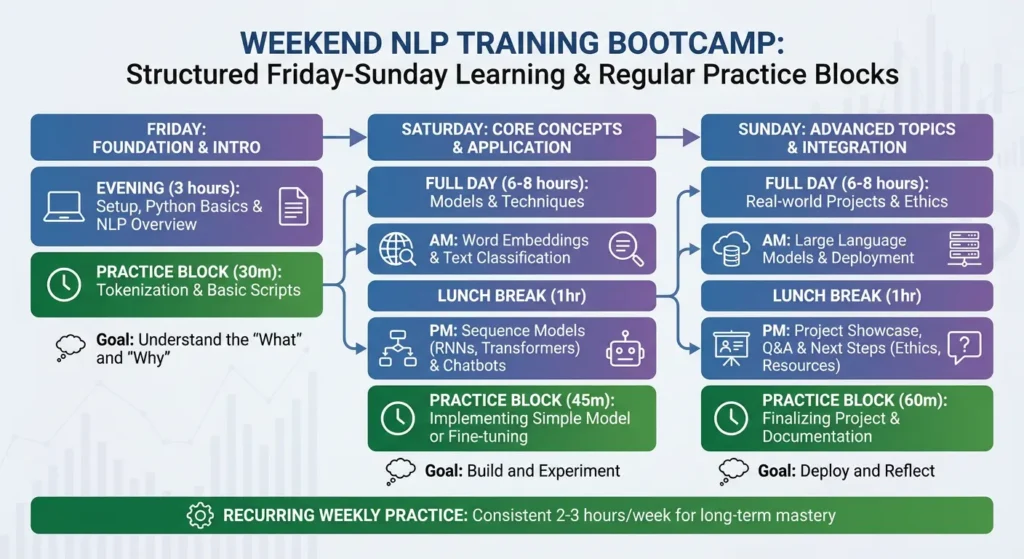
Weekend intensives: Many programs condense training into Friday-Sunday blocks over several months. You maintain your work schedule while dedicating weekends to skill development.
Evening programs: Some trainers offer weeknight sessions (typically 3-4 hours) spread over several months. This format minimizes disruption to your day job while providing regular practice and feedback.
Self-paced online options: Flexible certification pathways allow you to progress through material at your own pace, ideal if you travel frequently or have unpredictable work demands. The trade-off is requiring strong self-motivation and discipline.
Hybrid approaches: Consider combined NLP and coaching certification programs that integrate credentials efficiently. Rather than pursuing certifications sequentially, these programs blend NLP with coaching frameworks, saving time while building complementary skills.
The key is treating your training as a professional development investment, not a side hobby. Block training time on your calendar like you would important client meetings. Your skills will develop in proportion to the priority you assign them.
Is Faster Certification Always Better for Your Career?
Here’s an uncomfortable truth: the fastest certification isn’t always the most valuable one.
The Quality vs Speed Tradeoff
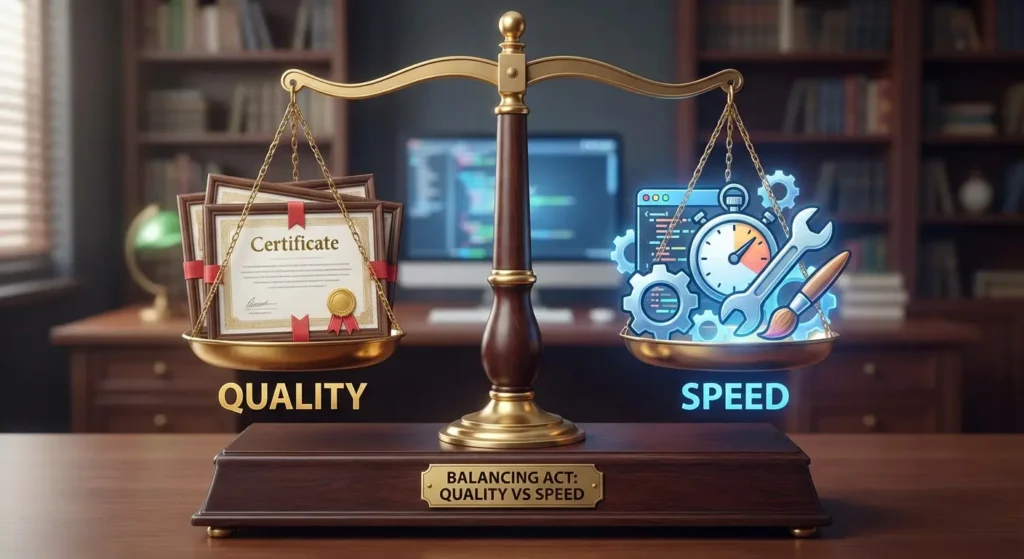
Seven-day certification intensives can deliver the curriculum requirements, but they rarely produce practitioners who can apply techniques confidently in complex professional situations. You’ll learn what the techniques are but not necessarily how to deploy them with nuance when the stakes are high.
Slower programs with built-in practice time and feedback loops develop more competent practitioners because skills have time to move from conscious competence (“I’m thinking through each step”) to unconscious competence (“This technique flows naturally in conversation”).
Why Application Matters More Than Certification Speed
Your career advancement doesn’t come from the certificate on your wall; it comes from the results you create. A leader who can genuinely read micro-expressions, build deep rapport, and reframe limiting beliefs in real-time is far more valuable than someone who crammed techniques for a week and never practiced them.
If you’re pursuing NLP to enhance your professional capabilities rather than just adding a credential to your LinkedIn profile, prioritize programs that emphasize application and provide feedback on your developing skills.
Building Genuine Expertise Takes Practice
The most successful NLP practitioners I’ve trained are those who’ve transformed their leadership presence and created breakthrough results in their organizations didn’t rush through certification. They committed to the practice hours, brought real challenges to training sessions, and applied techniques immediately in their work environments.
They understood that the benefits of NLP training compound over time. Each successful application builds confidence and skill, creating a virtuous cycle of growing competence.
Your Path Forward: Timeline Meets Commitment
So how long does it take to become an NLP practitioner professionally? The honest answer: 3-6 months to earn your certification, and 6-12 months of consistent practice to develop professional-level competence you can deploy confidently in high-stakes situations.
But here’s what matters more than timelines: your commitment to genuine mastery rather than credential collection. The practitioners who transform their careers aren’t those who rushed through the fastest program; they’re the ones who invested in quality training and then practiced relentlessly.
You can integrate NLP training into your professional life strategically without putting everything on hold. Choose a program format that fits your schedule, commit to the practice hours, and apply techniques in real situations immediately.
Your transformation starts with understanding the real timeline and committing to genuine mastery, not just a certificate. Take decisive action toward exploring our NLP practitioner training designed specifically for working professionals who want to elevate their leadership presence and communication impact.
What matters most to you, speed or depth of skill? The answer will guide your next step toward unleashing your professional potential.
Frequently Asked Questions
How much does NLP practitioner certification cost?
NLP Practitioner certification typically ranges from $500 to $3,000 depending on the training provider, format (online vs in-person), and program depth. Budget-friendly online programs start around $500-800, while comprehensive in-person intensives with experienced trainers can reach $2,000-3,000. Consider this an investment in professional development that pays dividends through enhanced communication and leadership capabilities.
Can I become an NLP practitioner without prior psychology experience?
Yes, no formal psychology background is required for NLP Practitioner certification. The training teaches you everything you need to know about NLP principles, techniques, and applications from the ground up. Many successful practitioners come from business, leadership, sales, education, and other non-psychology backgrounds.
What’s the difference between NLP Practitioner and Master Practitioner?
NLP Practitioner certification covers foundational techniques like rapport-building, anchoring, reframing, and the meta-model skills you’ll use immediately in professional settings. Master Practitioner builds on this foundation with advanced language patterns, modeling excellence, belief change work, and deeper intervention strategies. Think of Practitioner as your essential toolkit and Master Practitioner as your advanced specialization.
Do I need to renew my NLP certification?
Most NLP certifications don’t require formal renewal, but continuous professional development is essential for maintaining and deepening your skills. The best practitioners engage in ongoing learning through advanced training, practice groups, and real-world application. Your certification is permanent, but your competence grows through committed practice.
How long after certification can I start coaching clients?
You can technically start working with clients immediately after certification, but most new practitioners benefit from 2-3 months of practice with friends, colleagues, or volunteer clients first. This builds confidence, refines your skills, and generates testimonials before launching a paid practice. The timeline from certification to confident professional practice typically spans 3-6 months with consistent application.

